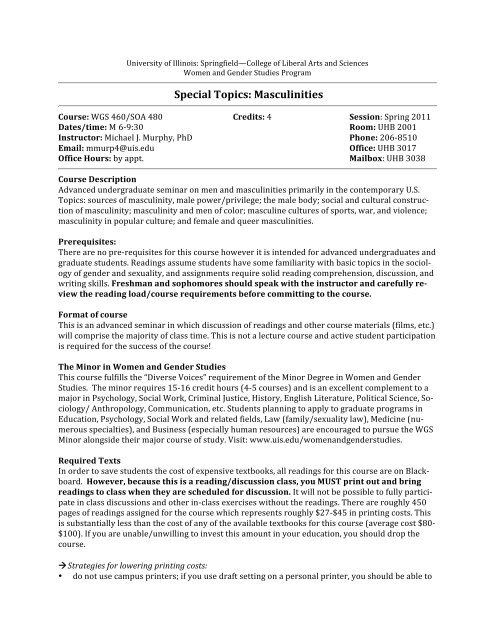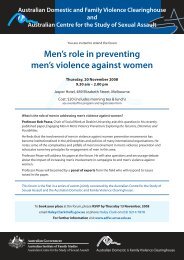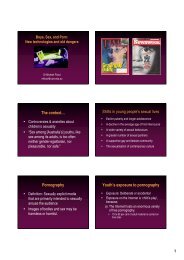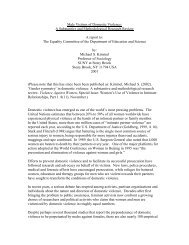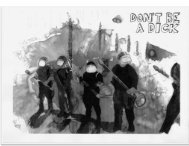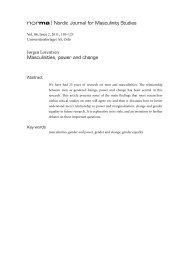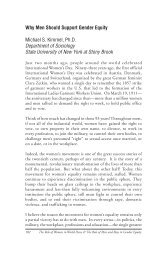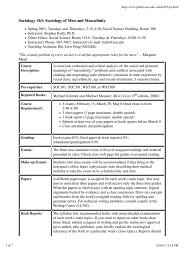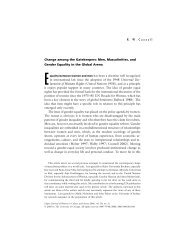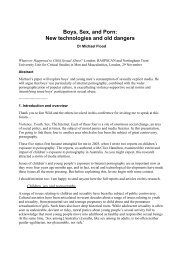Murphy, Syll-Masc (Spg 11).pdf - XY online
Murphy, Syll-Masc (Spg 11).pdf - XY online
Murphy, Syll-Masc (Spg 11).pdf - XY online
- TAGS
- murphy
- www.xyonline.net
Create successful ePaper yourself
Turn your PDF publications into a flip-book with our unique Google optimized e-Paper software.
University of Illinois: Springfield—College of Liberal Arts and Sciences<br />
Women and Gender Studies Program<br />
Special Topics: <strong>Masc</strong>ulinities<br />
Course: WGS 460/SOA 480 Credits: 4 Session: Spring 20<strong>11</strong><br />
Dates/time: M 6-‐9:30 Room: UHB 2001<br />
Instructor: Michael J. <strong>Murphy</strong>, PhD Phone: 206-‐8510<br />
Email: mmurp4@uis.edu Office: UHB 3017<br />
Office Hours: by appt. Mailbox: UHB 3038<br />
Course Description<br />
Advanced undergraduate seminar on men and masculinities primarily in the contemporary U.S.<br />
Topics: sources of masculinity, male power/privilege; the male body; social and cultural construc-‐<br />
tion of masculinity; masculinity and men of color; masculine cultures of sports, war, and violence;<br />
masculinity in popular culture; and female and queer masculinities.<br />
Prerequisites:<br />
There are no pre-‐requisites for this course however it is intended for advanced undergraduates and<br />
graduate students. Readings assume students have some familiarity with basic topics in the sociol-‐<br />
ogy of gender and sexuality, and assignments require solid reading comprehension, discussion, and<br />
writing skills. Freshman and sophomores should speak with the instructor and carefully review<br />
the reading load/course requirements before committing to the course.<br />
Format of course<br />
This is an advanced seminar in which discussion of readings and other course materials (films, etc.)<br />
will comprise the majority of class time. This is not a lecture course and active student participation<br />
is required for the success of the course!<br />
The Minor in Women and Gender Studies<br />
This course fulfills the “Diverse Voices” requirement of the Minor Degree in Women and Gender<br />
Studies. The minor requires 15-‐16 credit hours (4-‐5 courses) and is an excellent complement to a<br />
major in Psychology, Social Work, Criminal Justice, History, English Literature, Political Science, So-‐<br />
ciology/ Anthropology, Communication, etc. Students planning to apply to graduate programs in<br />
Education, Psychology, Social Work and related fields, Law (family/sexuality law), Medicine (nu-‐<br />
merous specialties), and Business (especially human resources) are encouraged to pursue the WGS<br />
Minor alongside their major course of study. Visit: www.uis.edu/womenandgenderstudies.<br />
Required Texts<br />
In order to save students the cost of expensive textbooks, all readings for this course are on Black-‐<br />
board. However, because this is a reading/discussion class, you MUST print out and bring<br />
readings to class when they are scheduled for discussion. It will not be possible to fully partici-‐<br />
pate in class discussions and other in-‐class exercises without the readings. There are roughly 450<br />
pages of readings assigned for the course which represents roughly $27-‐$45 in printing costs. This<br />
is substantially less than the cost of any of the available textbooks for this course (average cost $80-‐<br />
$100). If you are unable/unwilling to invest this amount in your education, you should drop the<br />
course.<br />
�Strategies for lowering printing costs:<br />
• do not use campus printers; if you use draft setting on a personal printer, you should be able to
print all readings for the cost of paper and one printer cartridge.<br />
• don’t print copyright pages/footnotes!<br />
• print two pages of reading on one piece of paper (often called ‘two-‐up’ printing).<br />
• download ALL readings to a portable drive and take to a copy center (which often offer dis-‐<br />
counts for bulk printing); ask for a UIS discount!<br />
Course requirements (course is worth 1000 points total):<br />
1. Class participation (300 points)<br />
Because this is a reading/discussion seminar, voluntary student participation is essential to the<br />
success of the course. Participation is not the same as attendance; participation is meaningful, rele-‐<br />
vant, and substantive engagement with the course materials in ways that further individual and<br />
group learning. The instructor will make every effort to invite students to participate but ulti-‐<br />
mately it is up to each student to fulfill this course requirement. If participation becomes an issue,<br />
the instructor reserves the right to measure participation through more formal methods such as<br />
readings quizzes; collecting readings and notes, etc.<br />
�Strategies for quiet learners: as you read, look for passages that 1) best state the author’s main or<br />
secondary points; 2) you don’t understand and would like some help with; 3) you disagree with.<br />
Mark these so that you can quickly and easily find them during class. If you have trouble formulat-‐<br />
ing a question/statement in the heat of the moment, prepare one or two questions in advance and<br />
read them when there’s a lull in class conversation. Be prepared to respond if you are invited to<br />
contribute!<br />
Participation grading criteria:<br />
• A: speaks often and demonstrates advanced understanding of readings; always brings hard<br />
copy of readings to class; demonstrates preparation; keeps discussion focused on learning; gen-‐<br />
erates discussion by picking up a discussion thread/engaging other students; listens respect-‐<br />
fully/attentively; volunteers topics/questions for discussion;<br />
• B: speaks often and demonstrates familiarity with the readings; brings hard copy of read-‐<br />
ings to most classes; contributions are focused on the discussion topic; responds but does not<br />
generate discussion topics;<br />
• C: may speak often but demonstrates little familiarity with the readings; has hard copy of<br />
readings some of the time; contributions are not conducive to learning; unable to substantiate<br />
statements with evidence from readings;<br />
• D: rarely speaks and so does not demonstrate familiarity with readings; rarely has hard<br />
copy of readings in class; contributions distract class/detract from learning; unable to substan-‐<br />
tiate perspective on readings; sometimes uses unapproved electronic devices in class;<br />
• F: never brings hard copy of readings to class; never voluntarily contributes; cannot make a<br />
substantive/relevant contribution when called upon; does not listen with a sense of engage-‐<br />
ment or respect; unable to substantiate perspective on readings; habitual use of unapproved<br />
electronic devices in class.<br />
2. Presentation of readings (300 points)<br />
Twice during the semester, each student will introduce assigned readings to the class and provide a<br />
2 page, single-‐spaced handout (double-‐sided printing is OK) for each member of the class. In gen-‐<br />
eral, each 15 minute presentation should summarize the readings (what are they about?); relate<br />
them to the course topic (how do they help us better understand masculinities?); and identify their<br />
most important claims/arguments (what is the author arguing/claiming?) In addition, please pro-‐<br />
vide some basic biographical information on the authors (who are they? What is their area of exper-‐
tise/research?) but this should not take up more than a sentence or two of your handout. Images<br />
are not necessary for handouts.<br />
�Hint: readings in this course have been selected because of the value of their ideas and argu-‐<br />
ments, not because they offer basic facts or information. Example: the article “Warrior Narratives<br />
in the Kindergarten Classroom,” was not selected because it helps us understand kindergartners!<br />
When in doubt, ask what each reading argues or helps us learn about the main topic “masculinities”<br />
and the sub-‐topic of each day’s class. And don’t be afraid to ask for help/hints from the instructor!<br />
3. Ethnomethodology experiment, paper, and presentation (400 points)<br />
A 3000 word (roughly 10 pp.) paper based on a social experiment that makes the ‘invisible’ social<br />
norms of masculinity visible by disrupting them. Paper will be due in three installments: a one-‐<br />
paragraph proposal, a description of the experiment with raw data; and a paper that ties the whole<br />
thing together, with analysis of findings using knowledge gained from readings and class discus-‐<br />
sion.<br />
4. Extra credit (50 points maximum)<br />
Occasional extra credit opportunities may be made available to the class. If you become aware of an<br />
event or speaker that is free, clearly relevant to course topic, and available to all students—please<br />
inform the instructor!<br />
General Course Policies<br />
1. <strong>Syll</strong>abus = contract<br />
Your continued enrollment in the course implies that you have read and agreed to be bound by the<br />
terms of the syllabus. Minor adjustments will be made at the discretion of the instructor; major ad-‐<br />
justments in consultation with the class as a whole.<br />
2. It’s your education!<br />
Your enrollment in this course implies you are interested in the material and want to be here. You<br />
are expected to assume responsibility for your education by attending class regularly, keeping up<br />
with readings, showing up on time and staying for the entire class, actively participating in class<br />
activities, finding out what you missed if you have an absence, turning in your work on time, retain-‐<br />
ing all your graded work in case there is a grade discrepancy, and communicating about potential<br />
problems in time for them to be solved.<br />
3. Attendance<br />
• Because so much of the learning in this class requires your physical presence in the<br />
classroom, regular, punctual attendance is required. A sign-‐in sheet will be circulated dur-‐<br />
ing the first few minutes of class. It will serve as proof of your presence/absence.<br />
• Each student is allowed one absence without grade penalty and can use it for any purpose<br />
without explanation: illness, team travel, job interview, etc. No distinction will be made be-‐<br />
tween excused or unexcused absences.<br />
• Second absence will result in a course grade penalty of 100 points (full letter grade).<br />
• Miss three or more classes and you automatically fail the class, regardless of the quality<br />
of other work.<br />
• If you are experiencing profound life issues (chronic illness, death in family, etc.) affect your at-‐<br />
tendance you should meet with the instructor to talk about negotiating an incomplete grade<br />
contract!
4. Classroom etiquette<br />
In order to facilitate learning:<br />
• use of personal electronic devices—cell phones, laptops, personal music players, etc.—is prohibited<br />
during class unless specifically allowed by the instructor. If you need to take an urgent<br />
call, excuse yourself from class and step outside!<br />
• to protect privacy, confidentiality, and intellectual property rights, video/audio recording in<br />
class is prohibited without permission from the instructor AND all enrolled students.<br />
• class time is not meal time! Please eat, drink, and use the restroom before/after class or on<br />
our break.<br />
5. Course perspective and classroom civility<br />
This course is explicitly taught from a gender-‐justice perspective that celebrates human gender and<br />
sexual diversity with an eye towards the social equality of women and men. Though readings and<br />
other materials are diverse, there has been no attempt to be ‘fair and balanced’ in their selection.<br />
However, this course is not an indoctrination camp where everyone is required to think alike. Your<br />
grade will be based on how well you engage with and demonstrate understanding of the<br />
course content, not whether you personally agree with that content. Everyone in the class—<br />
students, guests, instructor—has a right to a respectful hearing of their perspective on course top-‐<br />
ics and materials, however comments that are not civil, respectful, and courteous will be termi-‐<br />
nated. Repeat violators will be expelled from the course or referred to the Dean for a conversation<br />
about the virtues of civility in higher education.<br />
6. Explicit content<br />
Some of the readings and other material in this class contain explicit language and imagery about<br />
sex, gender, and sexuality. Materials have been selected for their educational—not shock—value.<br />
You are encouraged to explore any concerns during our class discussion, with the instructor during<br />
office hours, your academic advisor, or the campus counseling center. You might also use your free<br />
absence to ‘strategically’ miss a day that you might find particularly difficult. Please review the syl-‐<br />
labus carefully before committing to the course.<br />
7. Grading<br />
• late work is NOT accepted. Period. (Really!) Plan your time accordingly….<br />
• graded work must be submitted on paper NOT via email.<br />
• instructor reserves the right to adjust a student’s final course grade (up OR down) if grades<br />
earned on course requirements do not reflect a student’s overall performance in the course.<br />
Number to letter equivalents for assigning course grade:<br />
B+= 88-‐89% C+= 78-‐79% D+= 68-‐69% F = 0-‐59%<br />
A = 93% B = 83-‐87% C = 73-‐77% D = 63-‐67%<br />
A-‐ = 90-‐92% B-‐ = 80-‐82% C-‐ = 70-‐72% D-‐ = 60-‐62%<br />
8. Academic integrity<br />
Please familiarize yourself with the University’s Academic Integrity Policy, which governs student<br />
work in this course. Students caught cheating or representing someone else’s work as their own<br />
(plagiarism) will automatically FAIL the course and be referred to the Academic Integrity Council<br />
for appropriate discipline. Ignorance of the policy is no defense!
9. Disability accommodations<br />
UIS is committed to making college education available to all who choose to pursue it. Reasonable<br />
accommodations for those with disabilities will be made, as required by law and University policy.<br />
However, prompt action on your part is essential: if you require accommodations to complete your<br />
education please contact the instructor or the Office of Disability Services (ODS). No accommoda-‐<br />
tions can be made without prior registration and documentation with ODS located in HRB 80, (217)<br />
206-‐6666.<br />
Schedule of Topics and Readings<br />
All readings on Blackboard. Be prepared to discuss assigned readings on the date listed below.<br />
1/17: MLK Birthday: no class<br />
1/24: Introduction and syllabus review<br />
In class: watching something insightful and pithy; whatever strikes the instructor’s fancy<br />
1/31: What is masculinity? And why should we study it (in a Women’s Studies class)?<br />
Read:<br />
-‐Kilmartin, “Introduction” from The <strong>Masc</strong>uline Self, 17pp.<br />
-‐Brod, “Studying <strong>Masc</strong>ulinities as Superordinate Studies,” 14pp.<br />
2/7: Social Construction of <strong>Masc</strong>ulinities<br />
Read:<br />
-‐Kimmel, “<strong>Masc</strong>ulinity as Homophobia,” <strong>11</strong>pp.<br />
-‐Jordan/Cowan, “Warrior Narratives in the Kindergarten Classroom,” 15pp.<br />
-‐Messerschmidt, “Varieties of ‘Real Men,’” 15pp.<br />
2/14: Case study: performing masculinities<br />
Read:<br />
-‐Franklin, “Enacting <strong>Masc</strong>ulinity: Antigay Violence and Group Rape as Participatory Thea-‐<br />
tre,” 12pp.<br />
-‐Grazian, “The Girl Hunt: Urban Nightlife and the Performance of <strong>Masc</strong>ulinity as Collective<br />
Activity,” 18pp.<br />
View in class: Tough Guise: Violence, Media, and the Crisis in <strong>Masc</strong>ulinity (Northampton, Mass.: Me-‐<br />
dia Education Foundation, 2002). 85 min.<br />
2/21: Angry white men<br />
Read:<br />
-‐Kivel, “Young White Men,” 6pp.<br />
-‐Fine/Weis, “(In)Secure Times,” 16pp.<br />
-‐Calhoun, ‘“Will the Real Slim Shady Please Stand Up?’” 25 pp.<br />
View in class: Tim Wise: On White Privilege: Racism, White Denial & The Costs of Inequality (North-‐<br />
ampton, Mass.: Media Education Foundation, 2008). 57 min.<br />
2/28: Black masculinities<br />
Read:<br />
-‐Wickholm, “Plight Deepens for Black Men,” 2pp.<br />
-‐Herbert, “Too Long Ignored,” 2pp.<br />
-‐Majors, “Cool Pose,” 9pp.
-‐hooks, “Reconstructing Black Manhood,” 17pp.<br />
View: Hip-Hop: Beyond Beats and Rhymes (Northampton, Mass.: Media Education Foundation,<br />
2006). 61 min.<br />
3/7: Sexualities<br />
Read:<br />
-‐Bordo, “Pills and Power Tools,” 3pp.<br />
-‐Schultz, “Getting Off on Feminism,” 7pp.<br />
-‐Messner, “Becoming 100 Percent Straight,” 6pp.<br />
-‐Savin-‐Williams, “Memories of Same-‐Sex Attractions,” 16pp.<br />
3/14: Spring Break<br />
3/21: Case study: disconnecting sex/gender/sexuality<br />
Read:<br />
-‐Hill, “Feminine Heterosexual Men: Subverting Hetero-‐patriarchal Sexual Scripts?,” 7pp.<br />
-‐Heasley, “Queer <strong>Masc</strong>ulinities of Straight Men,” 10 pp.<br />
-‐Anderson, “Being <strong>Masc</strong>uline is Not About Who You Sleep with….” 10pp.<br />
-‐Ward, “Straight Dude Seeks Same: Mapping the Relationship between Sexual Identities,<br />
Practices, and Cultures,” 6pp.<br />
3/28: Interpersonal violence (and its discontents)<br />
Read:<br />
-‐Foubert, “Rape Statistics,” 2pp.<br />
-‐Dworkin, “I Want a Twenty-‐Four-‐Hour Truce During Which There Is No Rape,” 9pp.<br />
-‐Anderson/Umberson, “Gendering Violence: <strong>Masc</strong>ulinity and Power in Men’s Accounts of<br />
Domestic Violence,” 18pp<br />
-‐Carlson, “I’d Rather Go Along and Be Considered a Man: <strong>Masc</strong>ulinity and Bystander Inter-‐<br />
vention,” 12pp.<br />
-‐Schultz, “The Anti-‐Rape Rules,” 5pp.<br />
4/4: Cancelled (AMSA conference)<br />
4/<strong>11</strong>: Violence: war and terrorism<br />
Read:<br />
-‐Kimmel, “Globalization and its Mal(e)contents: The Gendered Moral and Political Economy<br />
of Terrorism,” 15pp.<br />
-‐Peteet, “Male Gender and Ritual of Resistance in the Palestinian Intifada: A Cultural Politics<br />
of Violence,” 17pp.<br />
-‐Cohn, “Wars, Wimps, and Women: Talking Gender and Thinking War,” 10pp.<br />
4/15: Last day to drop course/change grading option<br />
4/18: Sports (really, ‘football’)<br />
Read:<br />
-‐Nelson, “Men in Tight Pants Embracing,” 24pp.<br />
-‐Sabo/Panepinto, “Football Ritual and the Social Reproduction of <strong>Masc</strong>ulinity,” 7pp.<br />
-‐Dundes, “Into the Endzone for a Touchdown: A Psychoanalytic Consideration of American<br />
Football,” 14pp.
4/25: Case Study: sports and sexual violence<br />
Read:<br />
-‐Boeringer, “Associations of Rape-‐Supportive Attitudes with Fraternal and Athletic Partici-‐<br />
pation,” 9pp.<br />
-‐Crosset, “Athletic Affiliation and Violence Against Women,” 15pp.<br />
-‐Messner, “Triad of Violence in Men’s Sports,” 16pp.<br />
5/2: Brief presentation of papers, evaluations, and pizza party


